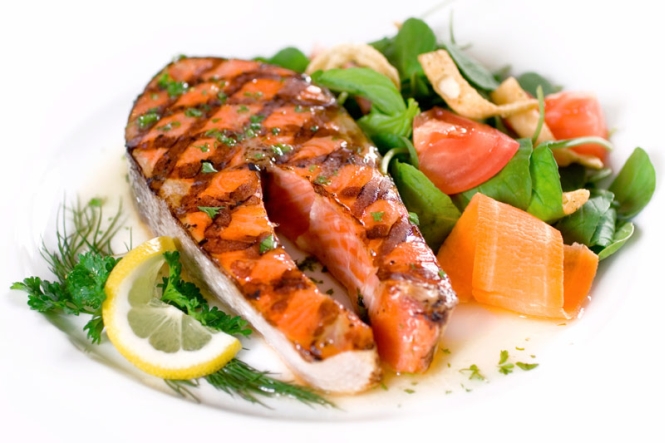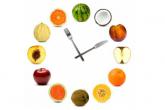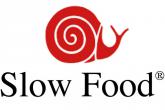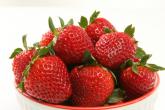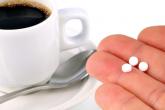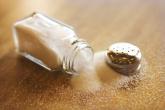17 rules for healthy eating by Healthynutritionguide.info
1. Eat 4-5 meals a day, without a ?snack? between meals
tional kilograms is the results. Starvation alternatively with eating 1-2 large meals also causes dysregulation of metabolism in the body. We shouldn?t eat until we?re completely full, but only to satisfy hunger. If the gaps between meals are too long, you can eat low-calorie food i.e.: apple, plain yogurt or drink water. Snacking between meals gives you extra and unnecessary calories.
|
|
|
2. Drink before meal or 2 hours after meal
Drinking during meals causes dilution of gastric juices and causes disorder of digestive processes. The habit of drinking liquids during a meal leads to gas formation, flatulence and constipation. To get used to the lack of drinks during a meal (when we feel dry in mouth) we should rinse the mouth during a meal. Avoiding drinks during a meal has a good impact on people who are overweight. During dry meal we eat less food, as a result we give fewer calories to the body.
3. Chew food carefully
The first digestion takes place in the mouth. Careful biting, chewing and mixing with saliva allows the gastric juices to digest precisely and faster, so food that enters the stomach can faster leave it.
4. Consume products with low glycemic index and low glycemic load
High insulin level conduce to overweight. This high level is associated with the consumption of a carbohydrate group, which rapidly and significantly increases temporary level of glucose in blood serum, in other words, they have so called high glycemic index (although not every product with high GI increases level of glucose in blood) and high glycemic load.However consumption of products with low glycemic index and low glycemic load causes slow and relatively small increase of sugar in blood and consequently - small burst of insulin. Such products don?t lead to obesity and metabolic diseases. It?s worth remembering that processing of food products (heat treatment and its time) increases both glycemic index and load.
5. Avoid excessive amounts of cholesterol
Animal fats increase level of cholesterol in serum and increase blood coagulation. Products rich in cholesterol also raise cholesterol concentration in blood. Vegetable oils don?t give such reaction. By substituting animal fats with vegetable oils (especially the olive oil cold pressed is recommended), it?s good to remember that the overall consumption of fat should be lower than it comes out of dietary habits. High fat content, which is unfavourable for the health, can be also found in fat meat, fat sausages, ice cream, cakes, cream, chips. When preparing meat for consumption, it is recommended to separate the visible fat. Among different culinary techniques is highly recommended to cook and bake without fat (on grill). When you butter your bread, take a thin layer.
6. Eat unprocessed products containing natural vitamins, mineral elements, fiber, essential unsaturated fatty acids
Fresh and unprocessed vegetables and fruits are the best and irreplaceable source of vitamins, minerals, fiber, as well as less-known compounds such as bioflavonoids, substances similar to vitamins (that aren?t an ingredient of vitamin) and the antioxidants. Due to high content of fiber, water and minimum fat content (except coconut and avocado) calorific value of raw fruits and vegetables is lower in comparison to the other products. Unprocessed fruits and vegetables should be added to every meal. It is recommended to use frozen fruits and vegetables in our menu (especially during winter-spring time) and pickled vegetables. The best source of Essential Fatty Acids (so called vitamin F) can be found in cold-pressed oils: linseed, rapeseed, soybean and corn, linseed and rapeseed, flaxseed, walnuts, wheat germ, sunflower seeds, pumpkin seeds, sesame seeds , marine food (saltwater fish), cold pressed olive oil. It is due to content of fat acids, that belong to the family of omega-3 and omega-6 and have the greatest biological activity.
7. Keep acid - alkaline balance in a body
The acid - alkaline balance - is a condition where specific balance between cations and anions in body fluids is sustained . It determines the appropriate pH and proper functioning of life processes. Foodstuffs differ in acidic elements content(the most important are: chlorine, phosphorus and sulfur) and in alkaline elements content (the most important are: calcium, sodium, potassium, magnesium), that?s why the composition of food we eat has an impact on the acid-base regulation in body . In the majority of food products that are basic in our diet acidic elements dominate. To keep acid-base balance of the body it is recommended to have 80% of diet by alkaline products, and 20% by acidic products.
8. Reduce food with artificial colours, preservatives and other synthetic food additives
Synthetic additives are added to food on a mass scale for recent years and it lead to a controversy. Many of them are withdrawn from use, others are considered to be dangerous, others are suspended of carcinogenic or allergic reaction, which means that when using they you have to be extremely careful because they may be dangerous to your health. Chemical additives can improve the appearance, taste, change the color, texture, smell or prolong life which means they deceive our senses: taste, smell and sight. The most suspicious e numbers are: E127 erythrosine, E131 patent blue, E142 green S, E211 sodium benzoate, E221 sodium sulphite, E250 - E252 nitrites and nitrates of sodium and potassium, E310 propyl gallate, E320 Butylated hydroxyanisole (BHE), E321 butylated hydroxytoluene (BHT), E338 phosphoric acid, E621 monosodium glutamate (MSG), E951 aspartame, E954 Saccharin. Sometimes it?s good to read composition of products we buy. In Poland there?s a regulation about food labeling and access to information about product with E number or name and technological function of food additive.
9. Eat your last meal at least 2 hours before bedtime
The last meal should be eaten at least 2 hours before bedtime. In this way it prevents from the difficulties in falling asleep caused by digestive system working intensively.
10. Try to avoid plants collected beyond the vegetative period (early vegetable)
All plants harvested beyond their vegetative period have different composition (i.e. lettuce, tomato, cabbage). Instead of sugars and proteins they contain intermediates ,such as nitrate, which as a result of biochemical processes change into nitrite within a few hours. They form carcinogenic nitrosamines in mouth.
11. Keep moderation in butter and margarine consumption
Butter is an animal product derived from cream of cow's milk. Butter consists of about 82% fat. White is its natural color, but as we associate butter with yellow or cream color, in order to meet our expectations producers add to the butter natural dye - carotene from the carrots. Content of saturated fat acid, trans isomers, cholesterol and being a high-energetic product are the main disadvantages of butter. Margarine is an emulsion of edible vegetable oils, animal fats, water or milk, as well as artificial additives that help to improve taste, nutritional value and validity. Fat content in margarine is variable, depending on the type of production and it varies from 45% to 80%. Not so long time ago the production of margarine was made by hydrogenation where unsaturated fat acids changes into trans isomers. Today the technology of margarine production both soft or in beaker, is based on esterified fats. That?s why most margarines don?t contain trans isomers at all or they have only a bit. However hard margarine cubes contain large amounts of trans isomers. Large quantities of artificial additives is the main disadvantage . The use of natural butter is recommended to children under 7, older people (the butter is digested easier than margarine), and pregnant and nursing women. Adults are recommended to use margarine in beakers.
12. Drink at least 1 liter of water a day
Water brings many benefits for your body, provided that you use an appropriate quality and purity. Water is a calorie-free beverage, that?s why in low calorie diet it is recommended to take greater amount than 1 liter. We shouldn?t exaggerate with mineral water, too much of it can cause kidney stones. If you drink mineral water, still spring water would be the best , because carbonated drinks stimulate the appetite. if you add lemon with peel or any other citrus it improves taste and adds natural Vitamin C, rutin, microelements and plant hormones. When drinking we should remember to drink water before meals or 2 hours after meals.
13. Try to limit the amount of coffee and common tea
Coffee and common tea (black) are beneficial for health when consumed no more than 2 cups a day and of course without sugar. In such quantities they have positive effect on the cardiovascular system and brain. Green tea is recommended because it has many necessary elements in its composition. Green tea purifies the blood, strengthens teeth, has antibacterial properties, it works against the stones in the liver, kidneys and bladder, lowers blood pressure, lowers bad cholesterol. Black tea due to tannin content is less recommended. We should also remember to avoid drinking tea and coffee, which stay for several hours, due to harmful substances forming in it.
14. Try to limit the amount of white flour
White flour is a refined product and is devoid of vitamins and minerals (it includes small amount of such compounds or it is artificially enriched). The composition of cereal includes starch and coating that is removed in case of white flour. Vitamins and minerals are contained in the coating and help to decompose and absorbe starch by body. White flour and products made of it (white bread, cakes, biscuits) are practically the source of calories (sugars) and high glycemic load. In a consequence body needs more vitamins and minerals to decompose and absorb and take them from the reserves of the body. It is recommended to eat products derived from untreated flour, which means wholemeal flour, graham flour or thickly ground. It?s better to eat products obtained without the use of yeast, in case of bread - based on sourdough.
15. Try to limit the amount of sugar and aspartame
Sugar just like flour is a refined product obtained from beets in our country. In contrast to beets, sugar is completely deprived of biologically active substances - vitamins, minerals, plant hormones. The sugar obtained from beets is cleaned, filtered and crystallized. In sugar production whitening treatment by using calcium chloride, which is a poison in fact, is often used. Pure sugar is sucrose - a source of calories and a high glycemic load. Similarly to white flour, in a consequence the body needs vitamins and minerals to decompose and absorb and takes them from the reserves of the body. Due to large intake of sugar it?s one of the main culprits of diabetes (according to statistics of morbidity in developed countries).The source of sugar is not only sugar food but also (and perhaps mainly) cookies, candies, soft drinks and biscuits.
Aspartame, the main ingredient in commonly used sweeteners is one of the most dangerous chemicals added to food. Aspartame consists of three compounds: aspartic acid, phenylalanine and methanol (which is supportive element for obtaining the aspartame). The last one is the most harmful (remains aren?t completely removed from aspartame), because it decomposes to formic acid and formaldehyde - highly toxic neurotoxin. Sources of aspartame in food: multivitamins, chewing gum without sugar, soluble cocoa, drugs, drinks, sweeteners, tea beverages, toppings, yogurt, jellies, fruit and milk drinks, diet drinks, instant coffee and tea, laxatives, frozen desserts, coffee beverages , mint breath fresheners.
If you add sugar and aspartame to your beverages and food, try to replace it with stevia, which is available at every healthy food store and large supermarkets - has a very low glycemic index and glycemic load. It?s worth mentioning natural - not pasteurized honey preferably from reliable suppliers. Although it hasn?t the lowest glycemic index and load and is a high-calorie product, it has a lot of valuable biologically active substances in its composition.
16. Try to limit the intake of homogenized and pasteurized cow's milk
Cow's milk according to its name is a food for young cattle - calves (which is necessary to grow hooves and horns),but not for people. Cow's milk is a casein type of milk. To digest casein we need rennet enzyme which an adult body doesn?t produce, that?s why milk is an indigestible product, which makes disturbances in digestion functioning. Moreover, cow's milk is a common allergen, it contains animal fat, causing increase of cholesterol. Calcium assimilation from milk is weak due to poor balance between calcium and phosphorus. There are interesting statistics about osteoporosis and juvenile insulin-dependent diabetics - most of them occur in countries with the highest intake of processed milk i.e. Canada, United States, United Kingdom, Finland, Sweden. These two diseases don?t occur in countries where cow's milk isn?t consumed . Due to all these objections processed cows' milk has gained the opinion of the silent killer.
Fermented dairy products (yogurt natural, kefir, curd, curdled milk) are less controversial than milk because the bacteria contained in these products do some work instead of our digestive system and these products are predigested even before consumption. In addition, these products contain flora which is friendly to our intestinal.
17. Try to limit amount of salt and monosodium glutamate (MSG)
Limit of salt intake (sodium chloride) and sodium glutamate reduces the risk of hypertension. Sodium increases blood pressure. Especially people with hypertension and those from families where there is high blood pressure should limit amount of salt . Moreover sodium goes with obesity and causes some diseases to heart, kidney, skin. It makes water kept in the body, which ovearloads the cardiovascular system. Daily salt intake shouldn?t be more than 6 grams. Current consumption is much higher. It?s good to resign from salting food before consumption, and limit adding salt during cooking. Sodium glutamate is a substance added to a food to intensify its taste and flavour. This substance is highly allergenic, it may be a cause of headaches, attacks of dyspnea, flushing. It?s worth remembering that a lot of salt, especially sodium glutamate can be found in products such as smoked meat, soups, seasoning mixtures.
If we care about the principles of healthy eating we shouldn?t forget about the other source of health - exercise, whilst exercising outside in the fresh air is a source of keeping fit and having healthy heart. Sports that are the most friendly to our body include: swimming, rowing and running.

